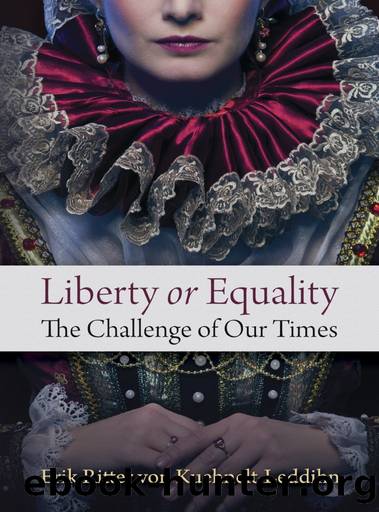Liberty or Equality: The Challenge of Our Times by Erik von Kuehnelt-Leddihn

Author:Erik von Kuehnelt-Leddihn [Kuehnelt-Leddihn, Erik von]
Language: eng
Format: azw3
Tags: Politics, History, Philosophy, Nonfiction, Religion
ISBN: 9781610160308
Publisher: Ludwig von Mises Institute
Published: 1952-01-01T00:00:00+00:00
4. THE EVOLUTION OF PROTESTANTISM AND EUROPEAN POLITICS
Having put the evolutionary aspects of Protestantism under the magnifying glass, we have to come to the conclusion that the slow change of the Evangelical creeds from a rigoristic movement to a fertile ground of secularism, sectarian liberalism and âdemocracyâ is a factor of the utmost importance for the understanding of newer European history. Geneva, which had seen the totalitarian tyranny of Maître Jehan Cauvin, produced Rousseau and became the seat of the Red Cross and the League of Nations; Boston, once a Jerusalem of the Puritans, became the centre of New England Unitarianism and transcendentalism. Is this evolution the result of the dialectics of Protestantism? Or is it a logical evolution moving in a straight line from the original premises? Or is it a âreactionâ pure and simple?
Probably we find all three elements responsible for the change. Yet whereas the last is a matter of psychological speculation, and the first is of an extremely involved nature outside the grasp of a simple and ready-made explanation, it seems to us that the factor of logical evolution not only explains the transformation with comparative ease, but also figures as the most powerful reason for this phenomenon.
When we concern ourselves primarily with this factor, we will soon make the discovery that we have to deal separately with theological tenets producing intrinsic, and with those producing extrinsic or exogenous effects. When Calvin, for instance, taught that salvation and damnation are preordained by God, the psychological relationship between the believer and his Master was automatically put on a basis different from that in the old Church. But when the Reformers disestablished papal (i.e., central, commanding) authority in dogmatic matters, they hardly foresaw the ultimate consequences in the whole religious, cultural and political spheres of human existence. (The results of the former changes are often wanted or expected; those of the latter are rarely foreseen.)
The literature on the intrinsic effects of Protestantism is very rich (we have to remember the works of Max Weber, Amintore Fanfani, G. P. Gooch, R. H. Tawney, Werner Sombart, Ernst Troeltsch, Christopher Dawson, etc.); but the exogenous forces to which Protestantism, as a religion as well as a cultural whole, is much more exposed than Catholicism have, by and large, been underrated. The Reformers rejected the whole secure âshellâ which Catholicism gave to its faithful; many of the major and minor supports and consolations, some of a sacramental, others of an intellectual or psychological nature, were eliminated. Thus whereas the believing Catholic is in frequent human or psychological contact with priests and saints, with popes and angels, the Lutheran (and the Calvinist) face God alone. Soli Deo Gloria! Whereas Catholicism has created an intensive and all-permeating religious culture, extending to wayside shrines, saintsâ corners, religious medals, even to âchristeningâ the landscape and the skyline (and has thus sometimes unavoidably included materialistic elements in her catholic and Catholic sphere), Protestantism wanted none of this pan-ecclesiasticism, of this cultural totalitarianism; man was to face the
Download
This site does not store any files on its server. We only index and link to content provided by other sites. Please contact the content providers to delete copyright contents if any and email us, we'll remove relevant links or contents immediately.
| Anthropology | Archaeology |
| Philosophy | Politics & Government |
| Social Sciences | Sociology |
| Women's Studies |
Cecilia; Or, Memoirs of an Heiress — Volume 1 by Fanny Burney(31333)
Cecilia; Or, Memoirs of an Heiress — Volume 3 by Fanny Burney(30934)
Cecilia; Or, Memoirs of an Heiress — Volume 2 by Fanny Burney(30889)
The Great Music City by Andrea Baker(21313)
We're Going to Need More Wine by Gabrielle Union(18073)
Bombshells: Glamour Girls of a Lifetime by Sullivan Steve(13108)
Pimp by Iceberg Slim(12931)
All the Missing Girls by Megan Miranda(12748)
Fifty Shades Freed by E L James(12451)
Norse Mythology by Gaiman Neil(11883)
Talking to Strangers by Malcolm Gladwell(11877)
Crazy Rich Asians by Kevin Kwan(8349)
Mindhunter: Inside the FBI's Elite Serial Crime Unit by John E. Douglas & Mark Olshaker(7834)
The Lost Art of Listening by Michael P. Nichols(6474)
Enlightenment Now: The Case for Reason, Science, Humanism, and Progress by Steven Pinker(6405)
Bad Blood by John Carreyrou(5769)
The Four Agreements by Don Miguel Ruiz(5511)
Weapons of Math Destruction by Cathy O'Neil(5037)
We Need to Talk by Celeste Headlee(4869)
